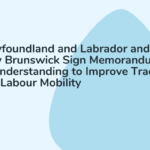Backgrounder
March 1, 2019
The Atlantic Immigration Pilot (AIP) is an innovative partnership aimed at attracting and retaining skilled immigrants and international graduates to meet the unique workforce needs of the Atlantic region. The goal is to ensure the long-term retention and integration of newcomers in Atlantic Canada to help drive economic growth.
The Government of Canada and the Atlantic provinces have made great strides in implementing the AIP since its launch in March 2017. As of February 25, 2019, there were 1,896 AIP designated employers in the Atlantic region. AIP designated employers made over 3,729 job offers to skilled foreign nationals or international graduates. As a result, there are already over 2,535 approved permanent residents destined for or already in the Atlantic Canada.
To achieve these results, Immigration, Refugees and Citizenship Canada (IRCC), the Atlantic Canada Opportunities Agency (ACOA) and the Atlantic provinces participated in almost 1,000 meetings, industry events, career fairs and information sessions with regional employers and international student advisory groups throughout the Atlantic region.
Initially launched as a three-year pilot, the AIP will be extended by two years to December 2021. This will give IRCC and the Atlantic provinces more time to assess the innovative aspects of this pilot: its employer-driven focus, mandatory settlement plan, and new model of partnership with the Atlantic provinces and ACOA.
In addition, recent changes to the AIP will see benefits for international students, employers in the healthcare sector and the provinces:
- International graduates will now have 24 months post-graduation to apply for the AIP. This change will increase the number of eligible international graduates that can participate in AIP and give them the time they need to complete the PR application process.
- Employers in the healthcare sector will be able to hire internationally trained nurses to work as continuing care and home care support workers in order to fill job vacancies.
- The Atlantic provinces will have new authorities to focus their AIP spaces on in-demand labour market needs.
- This change will lead to better oversight of the pilot and give provinces greater ability to manage designated employers.
- Beginning May 1, 2019, IRCC will require that applicants meet the language, education and work experience requirements of the AIP prior to being approved for a work permit.
Source: Canada.ca

